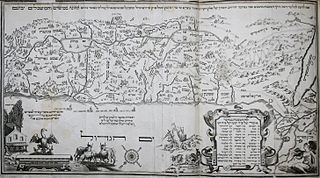Abiram, also spelled Abiron, is the name of two people in the Old Testament.

In the Hebrew Bible, Oholiab, son of Ahisamakh, of the tribe of Dan, worked under Bezalel as the deputy architect of the Tabernacle and the implements which it housed, including the Ark of the Covenant. He is described in Exodus 38:23 as a master of carpentry, weaving, and embroidery.
Ammihud is the name of several Hebrew Bible figures:
Ramoth-Gilead, was a Levitical city and city of refuge east of the Jordan River in the Hebrew Bible, also called "Ramoth in Gilead" or "Ramoth Galaad" in the Douay–Rheims Bible. It was located in the tribal territorial allotment of the tribe of Gad.

According to the Hebrew Bible, the Tribe of Manasseh was one of the twelve tribes of Israel. After the catastrophic Assyrian invasion of 720 BCE, it is counted as one of the ten lost tribes. Together with the Tribe of Ephraim, Manasseh also formed the House of Joseph.
Nethaneel - נתנאל "Gift of/is God", Standard Hebrew Nətanʾel, Tiberian Hebrew Nəṯanʾēl, also Nethanel:
- The son of Zuar, chief of the tribe of Issachar and one of the leaders of the tribes of Israel during the Exodus.
- One of David's brothers.
- A priest who blew the trumpet before the ark when it was brought up to Jerusalem.
- A Levite.
- A temple porter, of the family of the Korhites.
- One of the "princes" appointed by Jehoshaphat to teach the law through the cities of Judah.
- A chief Levite in the time of Josiah.
- A son of Passhur, one of the biblical priests who had taken a pagan wife but repented according to Ezra 10:22.
- Neh. 12:21.
- A priest's son who bore a trumpet at the dedication of the walls of Jerusalem.

Joab the son of Zeruiah, was the nephew of King David and the commander of his army, according to the Hebrew Bible.

Ephraim was, according to the Book of Genesis, the second son of Joseph ben Jacob and Asenath, as well as the adopted son of his biological grandfather Jacob, making him the progenitor of the Tribe of Ephraim.

Ibzan appears in the Hebrew Bible as the ninth of the Judges of Israel.
Joktan was the second of the two sons of Eber mentioned in the Hebrew Bible. He descends from Shem, son of Noah.
Uzal, in the Hebrew Bible, was a descendant of Shem and the sixth son of Joktan as per the Book of Genesis 10:27 and 1 Chronicles 1:21. His settlements are traced in the ancient name of Sanaʽa, the capital city of the Yemen. Easton's Bible Dictionary describes Uzal as a wanderer and the founder of an Arabian tribe.
Abidan, son of Gideoni, was a judge, head of the tribe of Benjamin and one of the leaders of the tribes of Israel at the time of the Exodus. His name means father of judgment or My fatherhas judged.
Baale of Judah, meaning "lords of Judah" or "citizens of Judah" was a city in the tribe of Judah from which David brought the ark into Jerusalem. In 1 Chronicles 13:6, the city is called Kirjath-jearim. According to Wilhelm Gesenius, the town of Baale of Judah is referred to not only as Kirjath-Jearim but also as Baalah.
Lo-debar was a town in the Old Testament in Gilead not far from Mahanaim, north of the Jabbok river in ancient Israel. It is mentioned in the Hebrew Bible as the home of Machir, a contemporary of David..

Manasseh or Menashe was, according to the Book of Genesis, the first son of Joseph and Asenath. Asenath was an Egyptian woman whom the Pharaoh gave to Joseph as wife, and the daughter of Potipherah, a priest of On. Manasseh was born in Egypt before the arrival of the children of Israel from Canaan.
According to Genesis 25:4, Abida was the son of Midian, and the grandson of Abraham and his wife Keturah. He had four brothers: Ephah, Epher, Hanoch and Eldaah.
Shur is a location mentioned several times in the Hebrew Bible.
This page is based on this
Wikipedia article Text is available under the
CC BY-SA 4.0 license; additional terms may apply.
Images, videos and audio are available under their respective licenses.
![]() This article incorporates text from a publication now in the public domain : Easton, Matthew George (1897). "Ahira". Easton's Bible Dictionary (New and revised ed.). T. Nelson and Sons.
This article incorporates text from a publication now in the public domain : Easton, Matthew George (1897). "Ahira". Easton's Bible Dictionary (New and revised ed.). T. Nelson and Sons.




